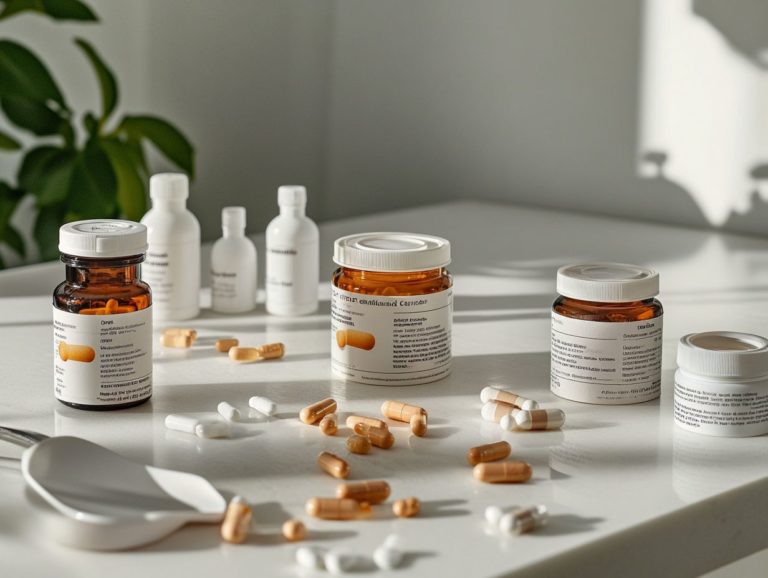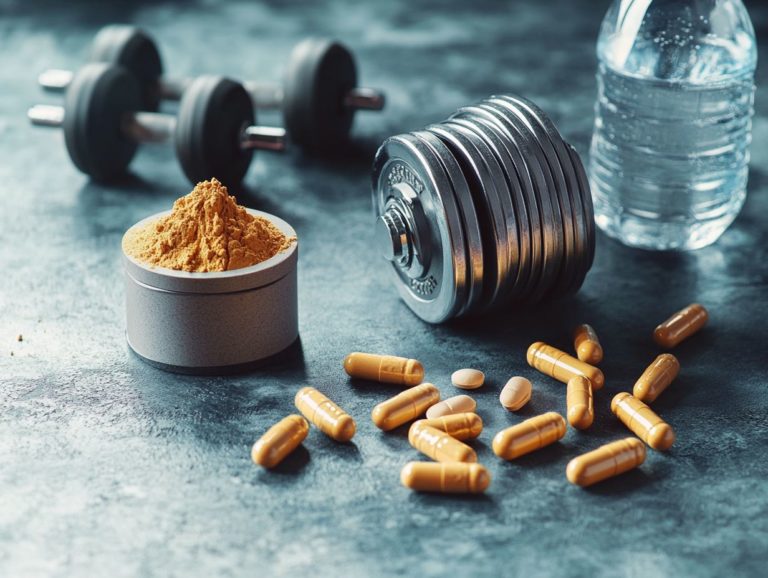5 Must-Know Facts About Iron Supplements
Iron is vital for your health. Many people face challenges with iron deficiency.
Navigating iron supplements and their side effects can feel daunting. This guide provides essential facts about iron supplements.
It covers appropriate dosages, timing, and iron-rich food sources.
Whether you’re concerned about a deficiency or thinking of supplementation, this information will empower you to make informed decisions about your iron intake.
Contents
- Key Takeaways:
- 1. Iron Deficiency Is a Common Problem
- 2. Iron Supplements Are Not Always Necessary
- 3. Possible Side Effects of Iron Supplements
- 4. Different Types of Iron Supplements
- 5. Proper Dosage and Timing Are Important
- How Can One Determine If They Need Iron Supplements?
- Your Top Iron Questions Answered
- What are the benefits of taking iron supplements?
- How can I tell if I need to take iron supplements?
- What is the recommended daily intake of iron for adults?
- Are there any side effects of taking iron supplements?
- How should I take iron supplements for maximum absorption?
- Can taking iron supplements lead to iron overload?
Key Takeaways:
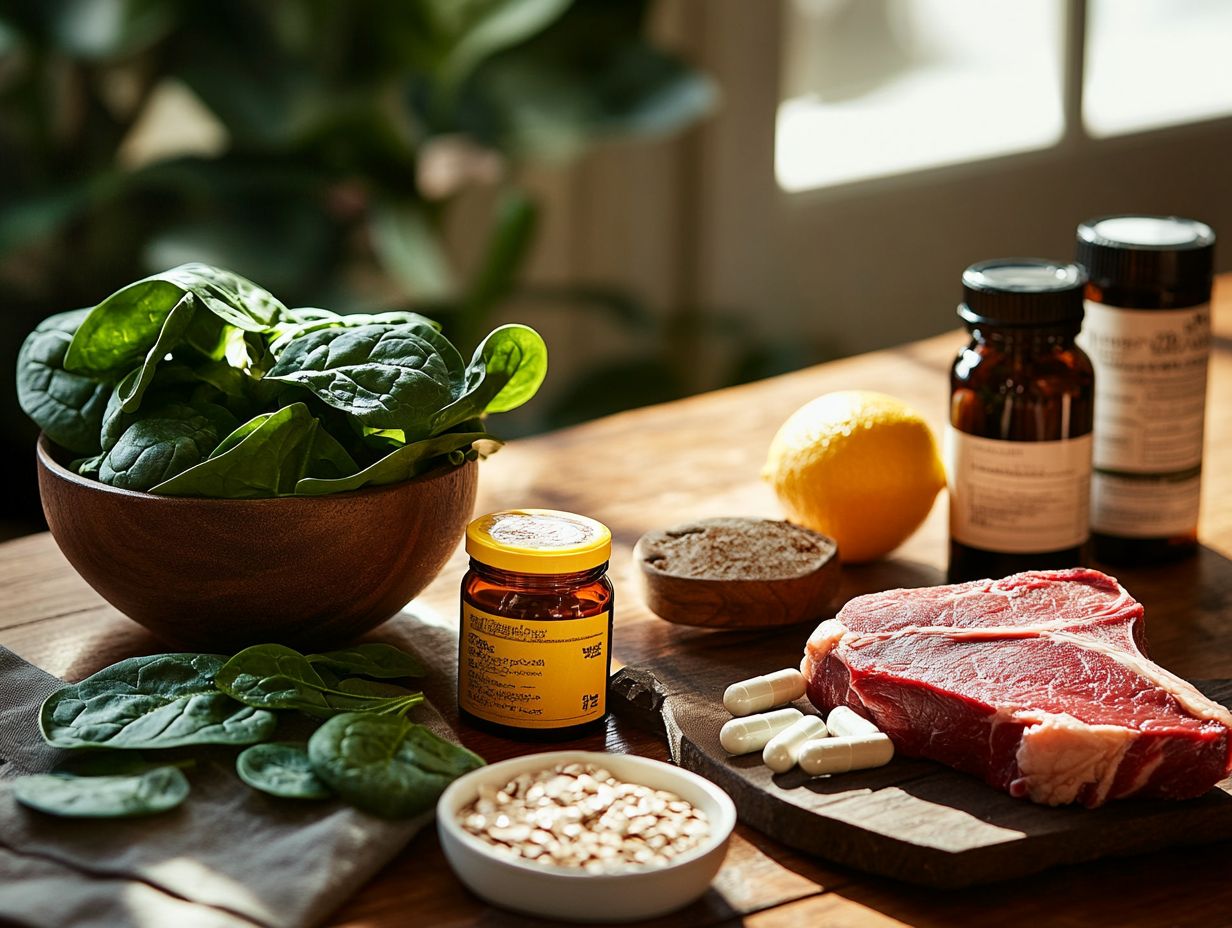
- Iron deficiency is common, but many people don t need supplements.
- Consider possible side effects before starting iron supplements.
- Understand the various types of iron supplements for effectiveness.
1. Iron Deficiency Is a Common Problem
Iron deficiency is a widespread nutritional issue that affects millions worldwide. It leads to reduced red blood cell production and impaired oxygen transport, causing various anemia symptoms.
This concern is especially pronounced among pregnant women and individuals following specific diets. Awareness and understanding are crucial for your health.
According to the World Health Organization, about 38% of pregnant women grapple with iron deficiency. This can have serious implications for both maternal health and fetal development.
If you re on a vegetarian or vegan diet, you might also be at a higher risk due to limited access to iron from animal products. The Centers for Disease Control and Prevention (CDC) acknowledges this challenge and promotes iron screening and supplementation programs, especially for those at risk.
To combat this deficiency, consider incorporating iron-rich foods into your diet, such as:
- leafy greens
- legumes
- nuts
- seeds
- fortified cereals
Embrace a balanced diet to address iron deficiency and boost your overall health and energy levels.
2. Iron Supplements Are Not Always Necessary
While iron supplements can be advantageous for some, they’re not always necessary. Many people can meet their iron requirements through a balanced diet rich in iron foods.
For those with heightened iron needs like pregnant women or individuals with chronic blood loss iron supplements might offer essential support. However, relying only on supplements can lead to missing out on the benefits of natural food sources, which provide additional nutrients.
Before considering iron supplements, consult with healthcare professionals. Improper dosage or unnecessary supplementation can lead to adverse health effects.
3. Possible Side Effects of Iron Supplements
Iron supplements can have a range of side effects, particularly gastrointestinal disorders, especially if taken in excessive amounts. This can worsen anemia symptoms instead of alleviating them.
Common issues include nausea, constipation, and abdominal pain, making it hard to stick to your regimen. To ease these effects, take your supplements with food or switch to a gentler formulation.
Preventing iron overdose is crucial. Avoid exceeding the recommended dosage and keep supplements out of children’s reach. Regularly monitor your iron levels through blood tests to adjust your intake as needed, ensuring safety and effectiveness.
4. Different Types of Iron Supplements
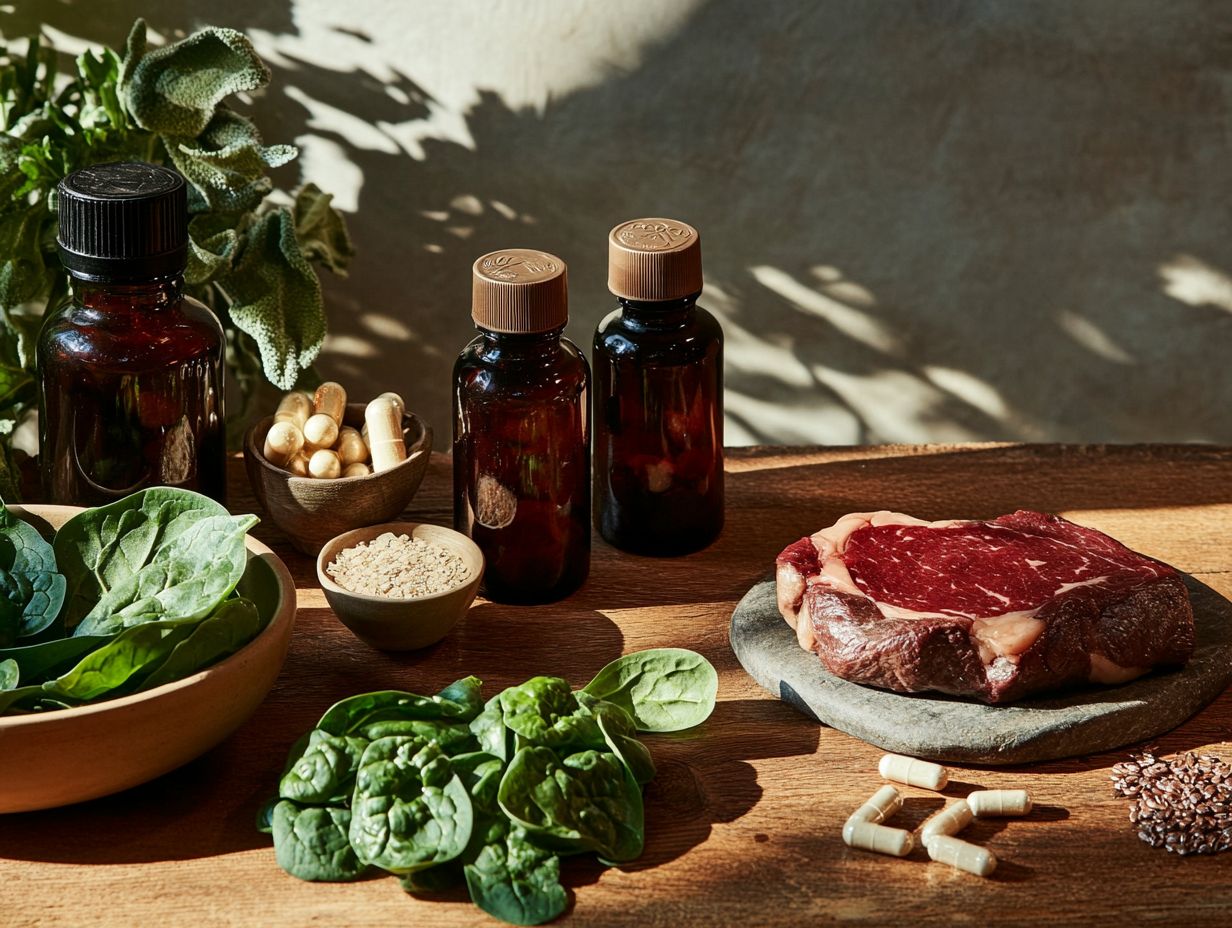
You ll find a variety of iron supplements on the market, such as ferrous sulfate and ferrous gluconate, each with unique levels of iron absorption and suitability. This is particularly important for individuals with conditions like hemochromatosis or those aiming to boost ferritin (a protein that stores iron) and hemoglobin (a protein in red blood cells that carries oxygen) levels.
For example, while ferrous sulfate is celebrated for its higher elemental iron content, you might prefer ferrous gluconate if you re looking for something that s easier on the stomach ideal for those who often experience gastrointestinal discomfort.
If you re pregnant and need to ramp up your iron intake to support fetal development, be sure to consult your healthcare provider for personalized advice! They can help you determine which form will best meet your needs while minimizing any potential side effects.
Don t overlook the power of vitamin C in this equation; it significantly enhances iron absorption. Pairing vitamin C-rich foods with your iron supplements can greatly improve the bioavailability of the mineral, making it easier for you to achieve your nutritional goals.
5. Proper Dosage and Timing Are Important
Understanding the proper dosage and timing of iron supplements is crucial for meeting your individual iron needs and effectively alleviating anemia symptoms. It’s important to ensure that your intake aligns with dietary guidelines and medical advice.
Dosages can vary significantly among different groups, such as pregnant women, children, and individuals with chronic conditions. This is why personalized consultations with healthcare providers are essential.
The timing of your iron intake is equally important; taking these supplements on an empty stomach generally enhances their absorption.
Be mindful of food interactions, especially with dairy products or high-calcium foods, which can impede absorption. Strategizing your intake around these factors is essential for maximizing benefits.
Regular blood tests are also beneficial, as they help identify specific iron levels and deficiencies. This allows you to adjust your supplement regimen to suit your unique health status.
How Can One Determine If They Need Iron Supplements?
Determining whether you need iron supplements often involves assessing symptoms of iron deficiency, reviewing your dietary habits, and undergoing a blood test to evaluate hemoglobin and ferritin levels. All of these help guide your decisions on potential supplementation.
Start by recognizing symptoms like fatigue, dizziness, or brittle nails, which can prompt you to seek professional advice. Healthcare providers typically begin with a thorough dietary assessment, examining your food intake to identify any gaps in iron-rich foods such as red meat, legumes, and leafy greens.
Next, blood tests are crucial; they measure not only hemoglobin and ferritin but can also shed light on transferrin saturation and total iron-binding capacity, giving you a clearer picture of your iron status. Based on these evaluations, healthcare professionals can recommend tailored iron supplements if necessary, ensuring you receive the appropriate dosage that aligns with your unique health needs and dietary profile.
What Are the Best Food Sources of Iron?
Incorporating iron-rich foods into your healthy diet is essential for preventing iron deficiency. Excellent sources include red meat, beans, lentils, and fortified cereals, accommodating both omnivorous and vegan diets.
If you consume animal products, lean meats like beef and chicken, along with seafood such as oysters and sardines, act as powerful sources of iron. For those following a plant-based diet, you can greatly benefit from iron-rich foods like spinach, quinoa, and tofu.
It’s important to recognize that your body absorbs non-heme iron from plant sources less efficiently than the heme iron found in animal products. To enhance that absorption, pair your vegan options with vitamin C-rich foods think citrus fruits, bell peppers, or strawberries. This simple practice not only ensures your iron levels remain adequate but also promotes overall nutritional balance.
By including these foods in your diet, you can effectively prevent iron deficiency and boost your overall health. Start incorporating these iron-rich foods into your meals today!
What Are the Signs of Iron Overload?
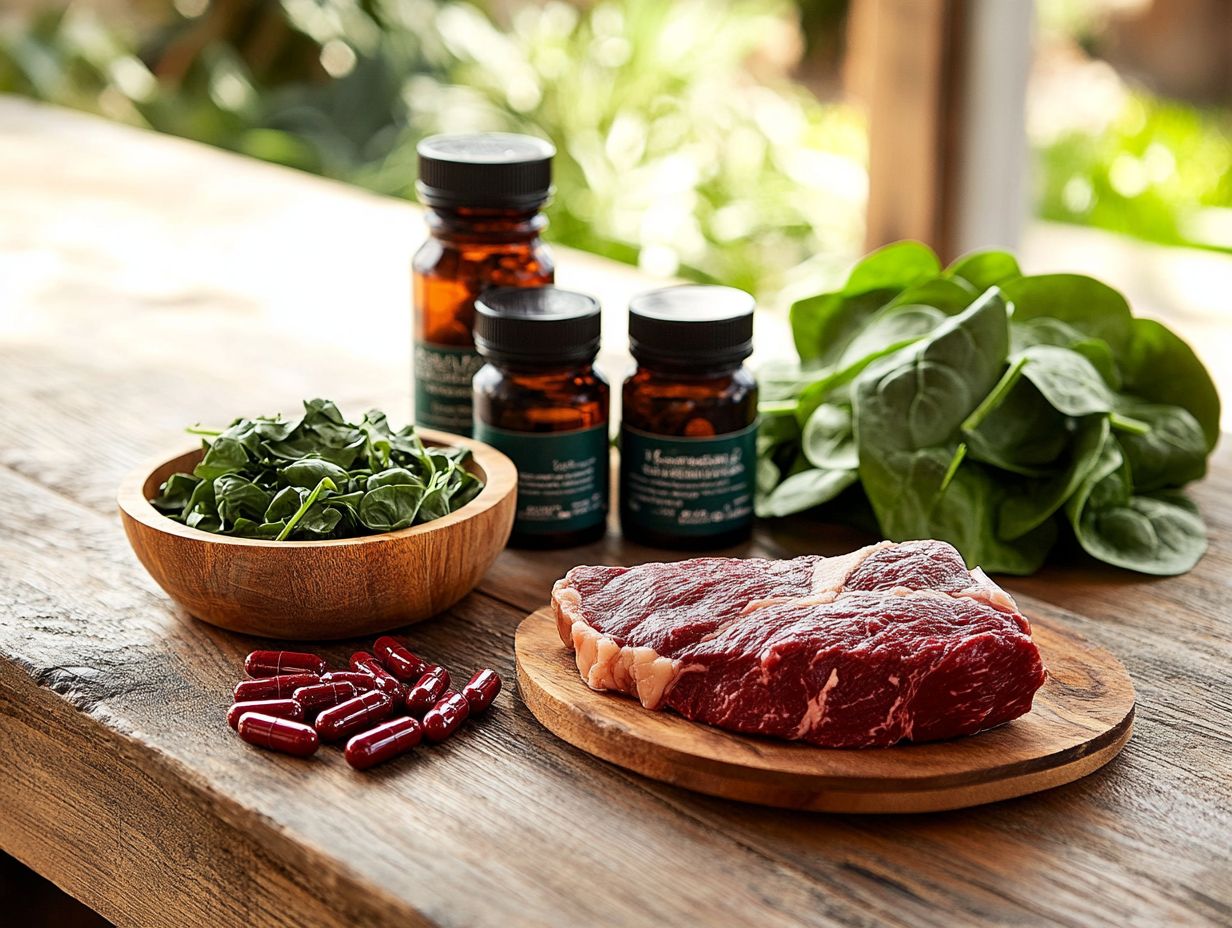
Iron overload can pose serious health risks. This is especially true for individuals with conditions like hemochromatosis.
You might notice symptoms like fatigue, joint pain, and elevated iron levels. These can be detected through a blood test.
These symptoms can often disguise themselves as signs of iron deficiency. This creates the potential for misdiagnosis and misguided treatment.
If you’re feeling fatigued, you may assume it’s due to low iron. In fact, your body could be grappling with an excess of it.
This highlights the critical importance of routine monitoring, especially for those at risk. This includes individuals with genetic predispositions or those who undergo frequent blood transfusions.
Early detection and a clear understanding of your body’s iron levels can help you avoid complications. It can also support your overall well-being. Awareness is an invaluable asset in maintaining your health.
How Can One Improve Iron Absorption?
Improving your iron absorption is essential, especially if you’re at risk of iron deficiency. You can enhance your body s ability to utilize iron by pairing iron-rich foods with sources of vitamin C.
Incorporating vibrant foods like citrus fruits, bell peppers, and tomatoes alongside iron from plant foods such as legumes and spinach is a smart strategy.
The way you cook can make a difference. For example, using cast iron cookware can boost the iron content of your meals.
However, it’s crucial to be aware of certain foods that can hinder iron absorption. Drinking tea or coffee around mealtime can reduce your body’s ability to absorb iron due to their tannin content.
By thoughtfully planning your meals and considering these combinations, you can significantly enhance your iron absorption. This promotes better overall health.
What Are the Risks of Taking Iron Supplements?
Taking iron supplements comes with risks that you should be mindful of. This includes stomach issues and the potential for iron overdose.
This is especially critical if the supplements are not monitored or prescribed correctly. It can worsen anemia symptoms.
If you’re considering iron supplementation, it’s important to recognize the possible adverse effects, such as nausea and constipation. Serious complications can also arise.
Consulting with your healthcare provider before starting any supplement regimen is essential. They can provide tailored guidance based on your health history and nutritional needs.
Regularly monitoring your iron levels is crucial to mitigate risks. Excessive iron accumulation can lead to severe conditions like organ damage.
Stay in touch with your healthcare team to ensure your iron usage is safe and effective. Your health depends on it!
How Can One Choose the Right Iron Supplement?
Choosing the right iron supplement requires evaluating your individual iron needs and considering any dietary restrictions. You may want to consult a healthcare professional for insights based on your blood test results and specific health conditions.
It s important to understand that not all iron supplements are created equal. Types like ferrous sulfate, ferrous gluconate, and ferrous fumarate each provide different levels of elemental iron and may be more suitable for some individuals.
Recommended dosages can vary significantly based on factors such as age, sex, and health status. This makes it essential to grasp your specific requirements.
Professional guidance ensures safe and effective supplementation. It also minimizes the risk of side effects and potential interactions with medications or other nutrients.
Taking a holistic approach by incorporating dietary sources of iron, like leafy greens and lean meats, can further enhance absorption and overall effectiveness.
Your Top Iron Questions Answered
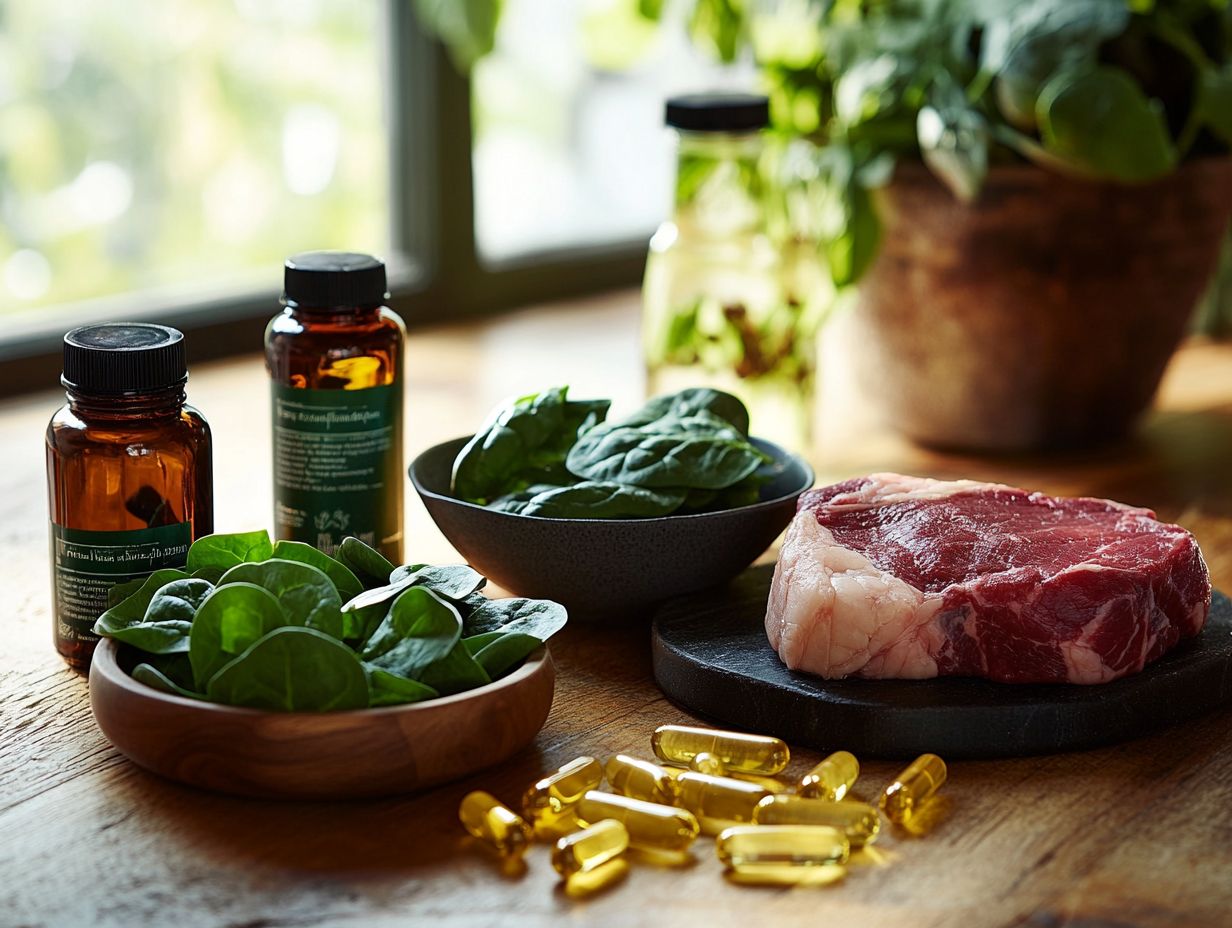
What are the benefits of taking iron supplements?
Iron supplements can work wonders for your health! They help prevent iron deficiency anemia and boost your energy levels.
They also improve cognitive function and support a healthy immune system. Additionally, they aid in red blood cell production and promote healthy pregnancy outcomes.
How can I tell if I need to take iron supplements?
If you experience fatigue, weakness, pale skin, or shortness of breath, you may have iron deficiency anemia. Consult your healthcare provider to see if iron supplements are right for you.
What is the recommended daily intake of iron for adults?
The recommended daily intake of iron for adults is 8 to 18 mg. This varies by age and gender, with women who are pregnant or menstruating needing higher amounts.
Are there any side effects of taking iron supplements?
Common side effects of iron supplements include nausea, constipation, and stomach pain. Always take them as directed and consult your healthcare provider if you have any adverse reactions.
How should I take iron supplements for maximum absorption?
To improve absorption of iron supplements, take them on an empty stomach. Pair them with vitamin C sources, like orange juice, for best results.
Avoid consuming them with calcium-rich foods or drinks, as calcium can hinder absorption.
Can taking iron supplements lead to iron overload?
Iron overload is rare, but it can happen if you consume too much iron. Follow the recommended dosage and consult your healthcare provider if you have health conditions or take other medications.



